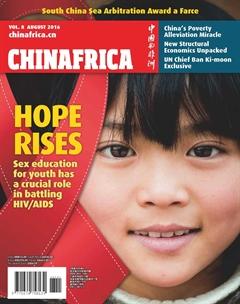News Roundup

China
Another World Heritage
The 40th session of the World Heritage Committee held in Istanbul decided to put Shennongjia in Hubei Province, China, on the prestigious World Heritage List as a natural site, bringing to 50 the number of listed Chinese sites.
Shennongjia is considered a treasure trove of wildlife and is also renowned for its plant diversity. A report cited at the meeting said, “Shennongjia has been a place of significant scientific interest particularly for botanists and the mountains have featured prominently in the history of botanical inquiry.” The meeting drew attention to the potential tourism pressure on the site, as a new airport has been built there.
Li Faping, head of the Shennongjia Forestry District, while voicing his pleasure at the sites acceptance into the heritage list by unanimous consensus, pledged better conservation effort.
Kenya
Agriculture Modernization
The Kenyan Government will harness digital tools to lift the agriculture sector from a stagnation occasioned by dysfunctional value chains and low participation of the youthful workforce, said Cabinet Secretary for ICT Joseph Mucheru. Mucheru said the digital boom Kenya has experienced lately will be channeled to the agriculture sector to hasten its modernization. He spoke in Nairobi during the unveiling of the African Development Banks 10-year strategy to accelerate agricultural transformation in Africa. Kenyan policymakers were sensitized on the continental lending institutions new roadmap to re-invent farming through technology adoption, investments and policy reforms.
namibia
Empowering Girls
The United Nations (UN) System in namibia launched “Prosperous Paths,” a unique educational outreach program targeting young girls in namibia. The objective of the program is to reach out to young girls at secondary school level and educate them on gender equality, womens empowerment as well as offer mentoring opportunities to enhance the status of the girl child in namibia. The launch of the program took place at the Jacob Marengo Tutorial College, Windhoek in July, where 600 young girls were addressed by the UN Resident Coordinator in namibia, Kiki Gbeho. She encouraged them to“take space, be prepared and dare to be different.” CA
Rwanda
Cutting GHG Emissions
Rwanda has announced plans to increase efficiency in the forestry sector and cut down greenhouse gas emissions to minimum proportions by 2017. Forests cover 29.2 percent of Rwandas surface. The government is targeting a 30-percent forest coverage by next year. The move will enable the country maintain rapid economic growth that is resource-efficient, low-carbon and climate-resilient. Vincent Biruta, Rwandas Minister of Natural Resources, said that the country is looking for more investments in the forestry sector to reduce deforestation and forest degradation.
Kenya
Taxi-hailing App
Kenyan mobile phone operator Safaricom and a software solutions company have launched a homegrown taxi-hailing app - Little Cab - to provide convenient and affordable taxi services to customers. The CEO of Craft Silicon, Kamal Budhabhatti, said, “Little Cab aims to achieve 1 million rides in the next six months as we seek to entrench and differentiate ourselves as a homegrown taxi app that will deliver distinctive customer experience.” The app enables users to enjoy lower rates, making Little Cab an affordable option in the Kenyan market, charging a minimum fare of $2.7 and a cost of less than $1 per km.
China
Aging Population
There were 222 million people aged 60 or above in China at the end of 2015, 16.1 percent of the total population, the Ministry of Civil Affairs said in July. The figure marked an increase of 0.6 percentage points compared with the previous year, when China reported 212.4 million people aged 60 or above. Of the 222 million, 143.86 million, or 10.5 percent of the total population were 65 or above, also up from the 10.1 percent in 2014, according to a ministry report. Under international standards, a country or region is considered to be an “aging society” when the number of people aged 60 or above reaches 10 percent or more. China has had over 10 percent of people aged 60 since 1999.
Ethiopia
Strong Position to End AIDS
Ethiopia plans to prevent more than half a million AIDS-related deaths and prevent up to 80,000 new HIV infections by 2020, according to the Federal HIV/ AIDS Prevention and Control Office (HAPCO). Dr. Alebachew Achamyeleh, acting Director at HAPCO, said the next five years are critical for Ethiopia in the fight against HIV and AIDS. “I believe Ethiopia is in a strong position to achieve the goal of ending HIV as a public health threat by 2030,” he said. Ethiopia has already exceeded its previous five-year target, having reduced new HIV infections from 0.28 percent in 2010 to 0.03 percent in 2015.
S. African Wins Caine Prize
South African writer Lidudumalingani Mqombothi has won the 2016 Caine Prize for African Writing, described as Africas leading literary award, for his short story Memories We Lost. The Caine Prize Chair of Judges announced Mqombothi as the winner of the $13,000 prize in July. Memories We Lost details the heart- wrenching story of two sisters, how they deal with the mental anguish one endures.
New IMF Deputy Managing Director
Zhang Tao, Vice Governor of the Peoples Bank of China (PBOC), has been recommended to serve as the next deputy managing director of the International Monetary Fund, effective from August 22, the organizations Managing Director, Christine Lagarde, recently announced. Zhang will replace Zhu Min, also from China, who retired in July. Zhang took up his current post at the PBOC, Chinas central bank, in May. Prior to the promotion, he was head of the banks Department of Treaty and Law. Zhang holds a bachelors and masters degree from the prestigious Tsinghua University and a Ph.D. in international economics from the University of California, Santa Cruz.
China
‘Left-behind KidsNumber Drops
China recorded about 560,000 fewer rural “left-behind” children in 2015 than the year before as more moved to cities to live with their parents, the Ministry of Education said in July. About 20.19 million“left-behind” children attended rural primary and junior high schools in 2015, down from 20.75 million in 2014, according to an annual ministry report. The phrase is used in China to describe rural children whose parents work in other cities. Last year, the number of rural children attending school in the cities where their parents work increased by about 720,000 to 13.67 million, according to the report. Chinas national household registration system, or hukou, has been a major reason that children of migrant workers have had less access to urban public schools. However, many city governments have gradually eased restrictions over the past few years.
China
5G Technology Commercialization
Chinas major mobile network operators including China Mobile, China Unicom and China Telecom are to commercialize 5G technology by 2020, with basic research and testing to be complete by 2018, according to a report by the Economic Information Daily. Leading Chinese telecom equipment providers like Huawei and ZTE are accelerating their research in 5G technology, and cooperative efforts between Chinese companies and their European counterparts are also underway. As the next-generation mobile communication technology, 5G is expected to raise network speeds 1,000 times, bringing vast business opportunities, especially in the Internet-of-Things industry. It may also transport virtual reality, holographic images and other new technologies directly to peoples lives.
China
Inspection Regulations
China unveiled a decision to amend regulations on customs inspections in response to a greater need for convenient customs clearance. The amendment includes measures to facilitate inspections, optimize inspection procedures and punish violations, according to the decision by the State Council in July. Customs inspections are intended to supervise the authenticity and legitimacy of exports and imports after customs clearance. The amendment gives customs authorities the right to collect goods from industry associations, government agencies and companies, as well as information on foreign trade activities from associations. The amendment will become effective on October 1.

